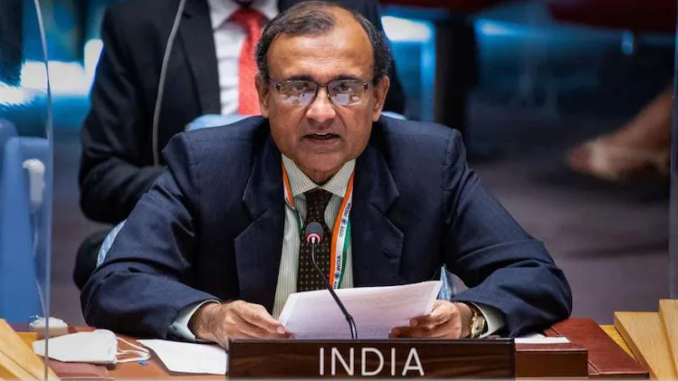
New Delhi: India’s envoy to United Nations T.S. Tirumurti on Thursday (September 9, 2021) called for an “inclusive dispensation” in Afghanistan, comments come days after Taliban announced its government in the country. Taliban, earlier this week, announced a 33-member government, which is being led by Prime Minister Mohammad Hassan Akhund and two deputies, Maulavi Abdul Salam Hanafi and Mullah Abdul Ghani Baradar. Seventeen of the names which have been announced are on the United Nation’s terror list.
Speaking at the United Nations Security Meeting on Afghanistan, Tirumurti said, “inclusive dispensation” should “represents all sections of Afghan society”, highlighting that a “broad-based, inclusive and representative formation” attained through an “inclusive negotiated political settlement would gain greater international acceptability and legitimacy.”
The government announced by the Taliban has no representation of women, no representation from the Hazara community, no ethnic minorities and includes 2 members of Haqqani–a known terror group. While the Taliban has been calling the government, acting, not many in the international community buy that.
This was the first meeting of this month under the Irish Presidency of the security council on Afghanistan. India was the president of the council for the month of August and had chaired three meetings on Afghanistan, with a resolution being passed as well.
Indian envoy pointed out to the “substantial and forward-looking” UN Security Council Resolution (UNSCR) 2593 resolution on Afghanistan being passed on 31st August, which took into account “collective concerns” in particular on terrorism, where it has noted the “commitment of the Taliban not to allow the use of the Afghan soil for terrorism, including from terrorists and terrorist groups designated under resolution 1267.” A number of Pakistan-based international terror groups like Jaish E Mohammad and Lashkar-e-toiba have been listed under the 1267 resolution.
India has a number of times, privately and publicly pointed out its concerns of Afghan soil being used by terrorists, the last being at the BRICS summit and NSA Ajit Doval’s meetings with visiting Secretary of the Security Council of the Russian Federation, General Nikolay Patrushev. Recalling the August resolution on Afghanistan, envoy Tirumurti pointed out that it underlined that “Afghan territory should not be used to threaten or attack any country or to shelter or train terrorists, or to plan or to finance terrorist acts” and “commitments made in this regard are respected and adhered to.”
During the statement, the Indian envoy called the situation in Afghanistan “very fragile” and being an “immediate neighbour and a friend to its people”, the current situation in the country is of “direct concern to us”. Afghanistan witnessed a Taliban takeover in August, with the pace of Taliban’s advancement shocking everyone. Talking about the “Uncertainties abound about the future of the Afghan people”, the envoy reiterated the “need for the voices of Afghan women to be heard, aspirations of Afghan children to be realized and the rights of minorities to be protected”.
Kabul saw a major protest rally, many of its participants being women. Visuals from the rally showed the Taliban beating up women protestors. Two journalists were also beaten up by the Taliban for covering the rally. India said that the international community need to “come together, rise above any partisan interests” and to “stand together with the people of Afghanistan in their desire for peace, stability and security in the country”. On UNAMA or United Nations Assistance Mission in Afghanistan Mandate, Indian envoy called on members of UNSC to decide the future with a focus “centered on Afghan people and their expectations from the international community to stand by them in this hour of crisis.”
Bureau Report
Leave a Reply